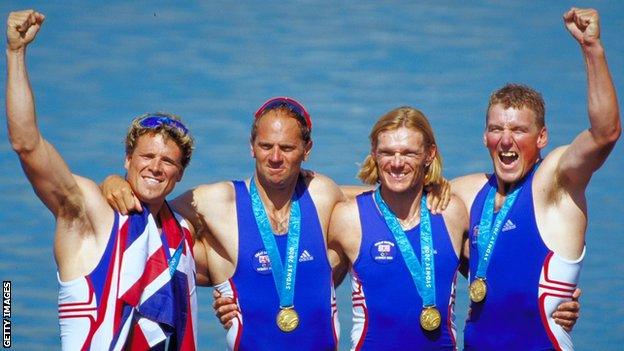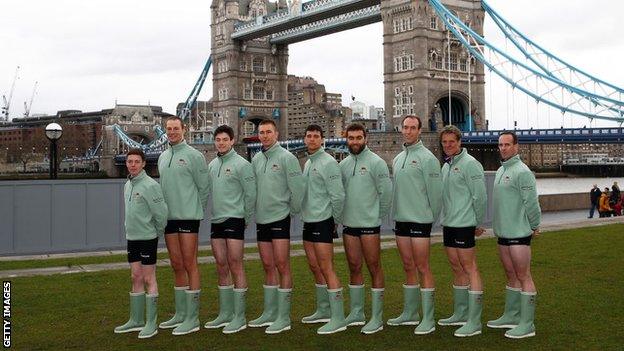Boat Race: James Cracknell on the challenges of his return to competitive rowing
- Published
Boat Race training has been humbling experience - Cracknell
2019 Boat Races |
|---|
Venue: River Thames, London Date: Sunday, 7 April Time: Women's race 14:13 and men's race 15:10 BST |
Coverage: Live on BBC One, Connected TV and online from 13:20 BST. |
"I was the only one who turned up with a pen and paper - there was no internet when I was at university."
Enrolling at the University of Cambridge and being selected for the 2019 Boat Race has been a "humbling" experience for James Cracknell.
In the boat house, he is not seen as a two-time Olympic gold medallist, nor a six-time world champion. He is a Masters student who has had to work just as hard for a seat in Cambridge's boat as all his other crew-mates.
On Sunday, he will become the oldest person to compete in the Boat Race. At 46, he is eight years older than previous record holder Andy Probert, the Cambridge cox in 1992.
Thirteen years have passed since Cracknell retired from elite rowing. But had he thought he would simply earn his Cambridge Blue blazer by name alone, he was soon brought back to reality.
"It's been the most humbling experience I've been through," Cracknell told BBC Sport.
"I walked through the door with a track record and by the end of the first week, that had gone.
"I'm sure there was a bit of respect there to start with, but that's gone, because you don't want to respect someone too much when you're trying to get the same seat."
'My neurologist would have said no'
In 2010, Cracknell fractured his skull when he was knocked off his bike by a truck in Arizona as he attempted to cycle, row, run and swim from Los Angeles to New York within 16 days.
He also suffered bruising to the brain, later experienced memory loss, and his personality altered. But don't expect less of him as a result.
"It had a really big impact on my health for a long time, and my behaviour for a couple of years, but to be honest the biggest effect has been people's perception," Cracknell said.
"You can understand certain injuries, and how long the healing time is. But people have a perception that [your mental faculties] are not going to be the same, whereas actually I wouldn't have got into Cambridge when I left school."
Cracknell, who graduated from Reading in 1993 with a degree in geography, is no stranger to a challenge.
Since retiring from competitive rowing, he has raced to the South Pole, finished 12th in the 156-mile Marathon des Sables - which was the best finish by a Briton at the time - and run the London Marathon on multiple occasions.
"Neurologists are great people, but if you listen to them too much, they'll say what they think you can do," Cracknell said.
"If I said to them that I wanted to go and study at Cambridge and I wanted to do the Boat Race, they would have said no.
"But you need people around you to challenge you, set your own limits, and work out how you're going to get there."

James Cracknell (left) won coxless four gold at the Sydney Olympics in 2000 alongside Steve Redgrave, Tim Foster and Matthew Pinsent. He retained the title four years later in Athens, with Steve Williams and Ed Coode replacing Redgrave and Foster.
Boat Race pride - and Tinder
Cracknell won gold in the coxless four at both the Sydney 2000 and Athens 2004 Olympic Games, as well as three World Championship titles in both the pair and four.
His former crew-mates have knighthoods. His current ones are young enough to be his sons - in an interview with the Daily Telegraph,, external he said he had tried to talk to them about Kurt Cobain, only to learn the Nirvana singer had died before they were born.
In turn, though, he has received an education wider than his Masters in human evolution could provide.
"I'm one of the responsible athletes who gets to drive the bus," he said.
2019 Boat Races: Could Jason Bell & Sam Quek hack it as a racer?
"The 20-year-olds educate me on a whole manner of things, from chemical equations to Tinder."
Cracknell's road to the Boat Race has been far from plain sailing, however. A rib injury kept him off the water for a period, and left him questioning whether it was worth it.
"The sport has moved on in the way people row, and so you are having to learn to row the same way they do. There's no point in doing it your way," he said.
"There were times in this past six months when I was cycling for a bit when I had damaged a rib, and I was watching them all go, and I was wondering, 'what am I doing this for?'
"When I was told I was being put in the blue boat, I can honestly say it was as proud a sporting moment as when [British head coach] Jurgen Grobler sat me down and said 'you're going to be in the coxless four', because Steve and Matthew were trusting their sporting reputations with me.
"That was a prouder moment than winning at the Olympics, having their trust.
"My coach had seen me push through a dark moment on my own when everyone was going out on the boat."
'What would happen if I didn't make the boat?'

Cracknell (second from right) is seven years older than the father of one of his crewmates
Being selected for Cambridge's flagship boat - or Oxford's for that matter - is an honour bestowed on few people.
The alternative is the reserve boat - known as Goldie. Cambridge beat Oxford in the men's, women's and both reserve races in 2018, but there was only one boat Cracknell wanted to be in.
"I was torn with the question that I have asked myself pretty much regularly since January - what would happen if I didn't make the blue boat?" he said.
"Would I row in Goldie? Would I be too arrogant? Think I was too good?
"If you'd asked me in September, I'd probably have said I wouldn't row. But the reality of spending time with and supporting the other guys in the squad is there are two boats and you don't see them as first or second."
Cracknell announced last week that he had split from his wife of 17 years, television presenter Beverley Turner, with whom he has three children - Croyde, Kiki and Trixie.
His son was a toddler when he retired from rowing - his daughters not yet born - and he credits them as the reason he pushed his "arrogance" aside.
"Part of me doing it was for my children. None of them saw me race, and it makes absolutely no difference to them which boat I was in, but they would remember if I threw my toys out of the pram and didn't do it," he said.
"I came to the conclusion that I would do it, whereas I probably would have been too arrogant six months ago.
"If that's the only thing I have learned since coming here, then that is a good thing going forward."